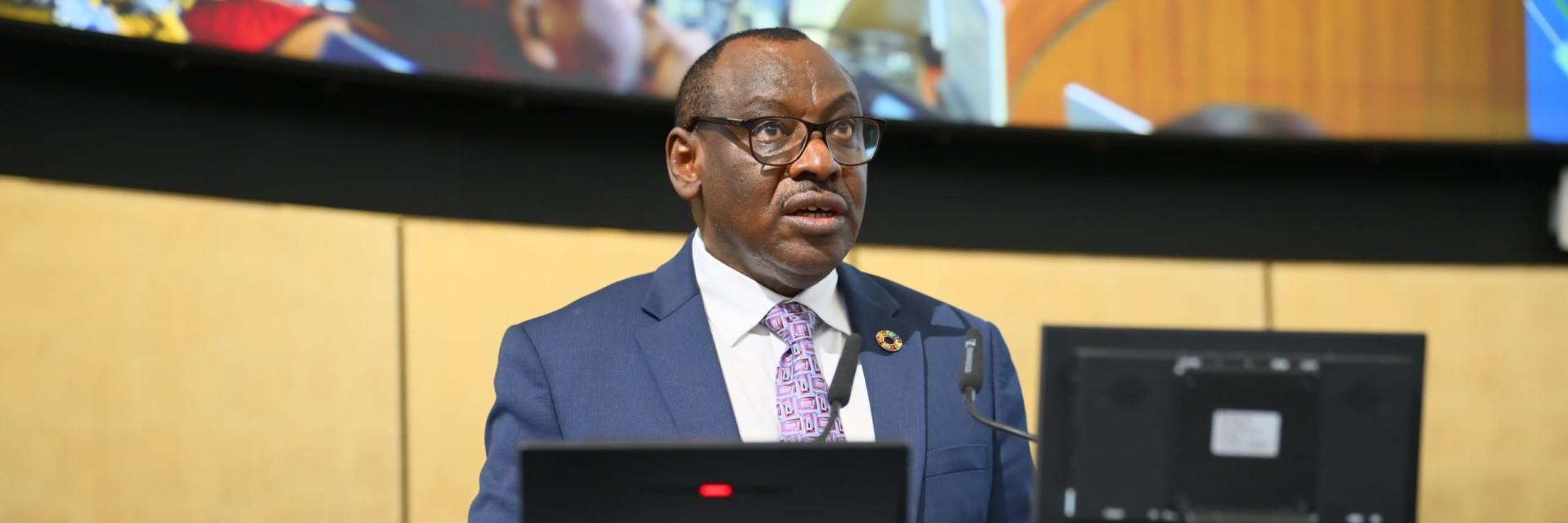EIGHTH AFRICA BUSINESS FORUM
Theme:
From Potential to Prosperity: Activating Africa’s Regional Value Chains
Statement
By
Mr. Claver Gatete
United Nations Under-Secretary-General and
Executive Secretary of ECA
17 February 2025,
Africa Hall, Addis Ababa, Ethiopia
H.E. Taye Atske Selassie, President of the Federal Democratic Republic of Ethiopia,
H.E. Duma Gideon Boko, President of the Republic of Botswana,
H.E. John Dramani Mahama, President of the Republic of Ghana,
H.E. Alexandre Barro Chambrier, Deputy Prime Minister of Gabon,
H.E. Dr. Monique Nsanzabaganwa, Deputy Chairperson, African Union Commission,
Dr. Ngozi Okonjo-Iweala, Director-General, World Trade Organization,
Dr. Sidi Ould Tah, President, Arab Bank for Economic Development in Africa,
Mr. Samaila Zubairu, President and CEO, Africa Finance Corporation,
Honourable Ministers,
Distinguished Delegates,
Esteemed Business Leaders and Partners,
Ladies and Gentlemen:
It is an honour to welcome you to the Eighth Africa Business Forum, convened under the critical theme: “From Potential to Prosperity: Activating Africa’s Regional Value Chains.”
I wish to begin by extending sincere gratitude to H.E. Taye Atske Selassie, President of the Federal Democratic Republic of Ethiopia, for Ethiopia’s gracious support as host, and to our esteemed guest Heads of State and Government and Deputy Prime Minister for honouring this important event.
In particular, I would like to take this opportunity to warmly congratulate President Duma and President Mahama on your recent electoral victories, which are resounding affirmations of the trust and hope your nations place in your leadership.
I also extend appreciation to distinguished leaders from the AfCFTA Secretariat, the WTO, the African Development Bank, Afreximbank, BADEA and other partner institutions for your steadfast commitment to Africa’s economic transformation.
There is no better place to host this vital conversation than Africa Hall – Emperor Haile Selassie’s gift to Africa, and the venue where, 60 years ago, Africa’s Founding Fathers laid the foundation for political emancipation and continental unity by signing the OAU Charter.
Today, as we build on that foundation, our task as leaders is to deliver economic prosperity for the continent.
Excellencies,
Distinguished Delegates,
Africa’s story has long been one of a paradox: a continent endowed with immense natural and human resources yet constrained by economic fragmentation and underdevelopment.
But should this be Africa’s fate?
Must Africa continue to watch its raw materials fuel the prosperity of other regions while its own economies struggle to industrialize?
The answer is a resounding no! History is not destiny.
The time has come to rewrite Africa’s narrative from a continent of untapped potential to a global powerhouse of production, innovation and economic self-sufficiency.
And we have the means to do so.
With a single market of 1.5 billion people and a combined GDP exceeding US$3 trillion, the African Continental Free Trade Area (AfCFTA) offers us the blueprint for this transformation.
However, a blueprint alone is not enough.
We must move from vision to implementation and ensure that the AfCFTA serves as the engine that will drive competitive regional value chains in key sectors such as agriculture, livestock and pharmaceuticals.
At the heart of this transformation lies Africa’s greatest asset – its people, particularly its youth.
With over 60% of the continent’s population under the age of 25, Africa has the world’s largest and fastest-growing youth demographic.
Yet, today, millions of our young people remain unemployed or underemployed, with their potential stifled by limited access to economic opportunities.
But Excellencies, Distinguished Delegates,
How can we, in good conscience, accept this status quo?
The answer is clear: we must create sustainable jobs by leveraging regional value chains, empowering youth-led enterprises and harnessing digital innovation.
And this is why this Forum is timely.
With over 65% of Africa’s workforce engaged in agriculture, why does Africa remain a net importer of food?
Why must we continue to rely on external markets when our agro-industrial potential is unparalleled?
Similarly, Africa’s livestock sector, valued at over US$65 billion, remains largely underdeveloped, in spite of its immense capacity to drive industrial growth and food security.
And in the pharmaceutical sector, which is projected to reach US$70 billion by 2030, why do we still import over 70% of our medicines when we have the knowledge, resources and demand to build a self-sufficient pharmaceutical industry?
Of course, we cannot forget how the COVID-19 pandemic exposed Africa’s vulnerability.
Africa therefore has no other option than to strengthen its pharmaceutical manufacturing capacity to guarantee the continent’s health security and economic resilience.
Excellencies,
Distinguished Delegates,
We can no longer afford to export raw commodities and import finished products.
An Africa that prospers is one that embraces industrialization, champions value addition and advances regional integration.
I propose four recommendations to achieve this.
First, we must scale up regional agro-processing hubs and Special Economic Zones that transform raw materials into high-value exports.
Second, we must establish harmonized regulatory frameworks to facilitate trade in pharmaceuticals and biomanufacturing.
Third, we must invest in infrastructure and financing mechanisms to lower the cost of doing business across borders.
Finally, we must strengthen public-private partnerships to drive innovation and entrepreneurship, accelerate digitalization and technology adoption, and position Africa as a leader in the Fourth Industrial Revolution.
Excellencies,
Distinguished Delegates,
The time for incremental change is over. Africa must industrialize with urgency.
And the Economic Commission for Africa remains ever ready to work with African governments, the private sector and development partners to drive this transformation.
Through targeted policies, innovative financing mechanisms and strategic partnerships, we will, working together, unlock Africa’s full economic potential.
Thank you.

